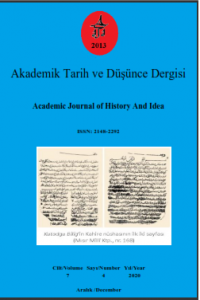Öz
Although his period of reign, 1808-1839 (31 years), was very long, Mahmud II was one of the most ignored Sultans of the nineteenth century. His diplomatic abilities in particular are never taken into account when scholars examine the fevered diplomatic developments between 1831 and 1840; called ‘The Eastern Question’ by western historians. One of the main reasons for this ignorance is prejudice and preconceived ideas in the western scholar’s mind. According to the general attitude of these historians, Mahmud and his statesmen were passive actors in the process, and did almost nothing apart from watch the diplomatic developments in their territories unfold. Such a view, infused as it is with ‘Orientalist’, represents the attitudes of the European statesmen of the time and in the absence of the view from the Turkish side of the hill, has tended to hold the field. Furthermore, it could be revealed that the cause of this biased point of view is repudiation of the Eastern World with views based only on their own western sources. These issues continue to be discussed under the umbrella of Orientalism, a concept originated by Edward Said. However, this has been conducted as a cultural history centred debate and therefore it seems that it might be useful to provide diplomatic examples in order to make some contribution to the Orientalism debate. In this context, although this article is not a theoretical study, it will attempt to convey the essence of the diplomatic struggle story of Mahmud and his diplomats in the years of 1834 and 1835.
Anahtar Kelimeler
Mehmet Ali Pasha Crisis Anglo-Ottoman Relations Ottoman Diplomacy
Kaynakça
- Laurence Mark Guymer, Sir Henry Bulwer and the Ottoman Empire 1858-1865 [unpublished UEA Phd. thesis, 2009]
- M.S. Kütükoğlu, Osmanlı-İngiliz İktisadi Münasebetleri 1838-1850 Vol.I. (Istanbul: 1974)
- S. Goryanof, Rus Arşiv Belgelerine göre Boğazlar ve Şark Meselesi. (İstanbul: 2006)
Öz
Saltanat süreci 31 yıl gibi, (1808-1839), uzun bir dönemi kapsamasına rağmen, II. Mahmud 19. Yüzyılın en fazla ihmal edilen Sulatanlarından bir tanesidir. Batılı tarihçiler tarafından ‘Şark Meselesi’ olarak adlandırılan 1831-1840 arasındaki tansiyonu yüksek diplomatik gelişmeler, alimler tarafından incelenirken, özellikle II. Mahmud’un diplomatik yetenekleri yeterince dikkate alınmamıştır. Bu bihaberliğin en önemli sebelerinden bir tanesi batılı alimlerin zihinlerindeki peşin hükümler ve önyargılardır. Bu tarihçilerin genel yaklaşımına göre, Mahmud ve devlet adamları bu süreçte pasif aktörlerdi ve kendi hüküm sürdükleri topraklarda meydana gelen diplomatik gelişmeleri seyretmekten başka bir şey yapmamışlardı. Dönemin Avrupalı devlet adamlarının yaklaşımlarını sergileyen bu nevi bir Oryantalist görüş Türk tarafının hikayesinin yokluğundan kaynaklanmakta ve alana hakim olmaya devam etmektedir. Ayrıca bu peşin hükümlerin sebebi, batının sadece kendi kaynaklarına dayanması nedeniyle doğu dünyasını tanımaması olarak ortaya konabilir. Bu tarz sorunlar Edward Said tarafından ortaya konan Oryantalizm şemsiyesi altında tartışılmaya devam etmektedir. Bununla birlikte bu tartışmalar kültürel tarih merkezli yürütülmektedir ve bu yüzden Oryantalizm tartışmalarına katkıda bulunmak için bu anlamda diplomatik örneklemler sunmak da faydalı olacaktır. Bu bağlamda, bu çalışma her ne kadar teorik bir çalışma olmasa da, II. Mahmud ve diplomatlarının 1834 ve 1835 yıllarındaki diplomatic mücadele hikayesinin hakikatini ortaya koymaya çalışacaktır.
Anahtar Kelimeler
Mehmet Ali Paşa Krizi İngiltere-Osmanlı İlişkileri Osmanlı Diplomasisi
Kaynakça
- Laurence Mark Guymer, Sir Henry Bulwer and the Ottoman Empire 1858-1865 [unpublished UEA Phd. thesis, 2009]
- M.S. Kütükoğlu, Osmanlı-İngiliz İktisadi Münasebetleri 1838-1850 Vol.I. (Istanbul: 1974)
- S. Goryanof, Rus Arşiv Belgelerine göre Boğazlar ve Şark Meselesi. (İstanbul: 2006)
Ayrıntılar
| Birincil Dil | Türkçe |
|---|---|
| Bölüm | Makaleler |
| Yazarlar | |
| Yayımlanma Tarihi | 30 Aralık 2020 |
| Kabul Tarihi | 27 Ocak 2021 |
| Yayımlandığı Sayı | Yıl 2020 Cilt: 7 Sayı: 4 |
По всем вопросам приема статей и выпуска очередных номеров обращаться в редакцию соответствующего журнала


